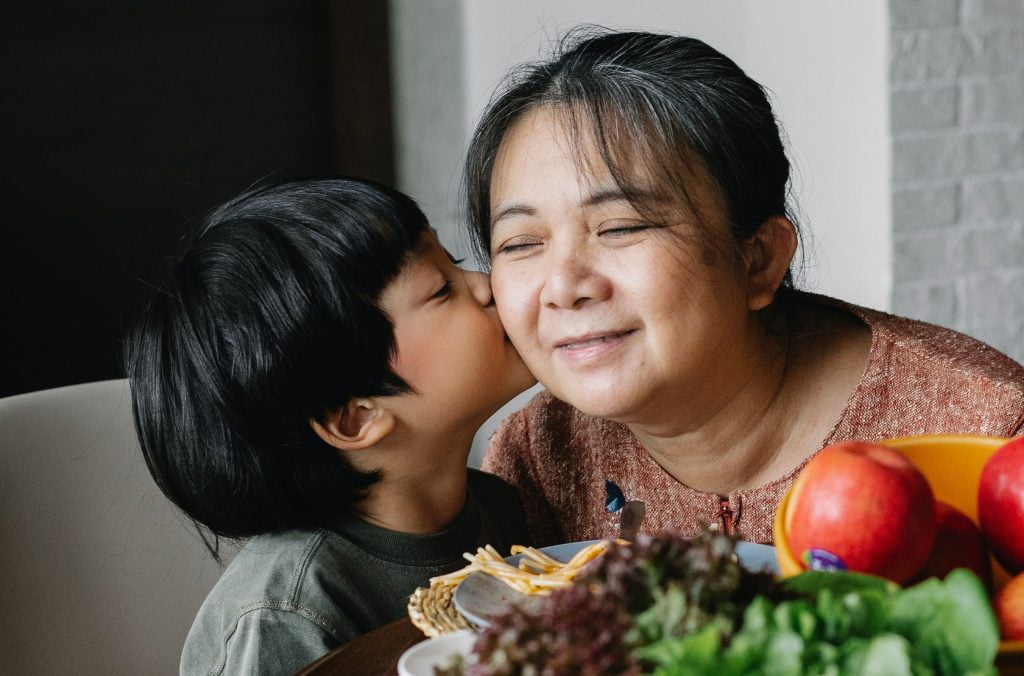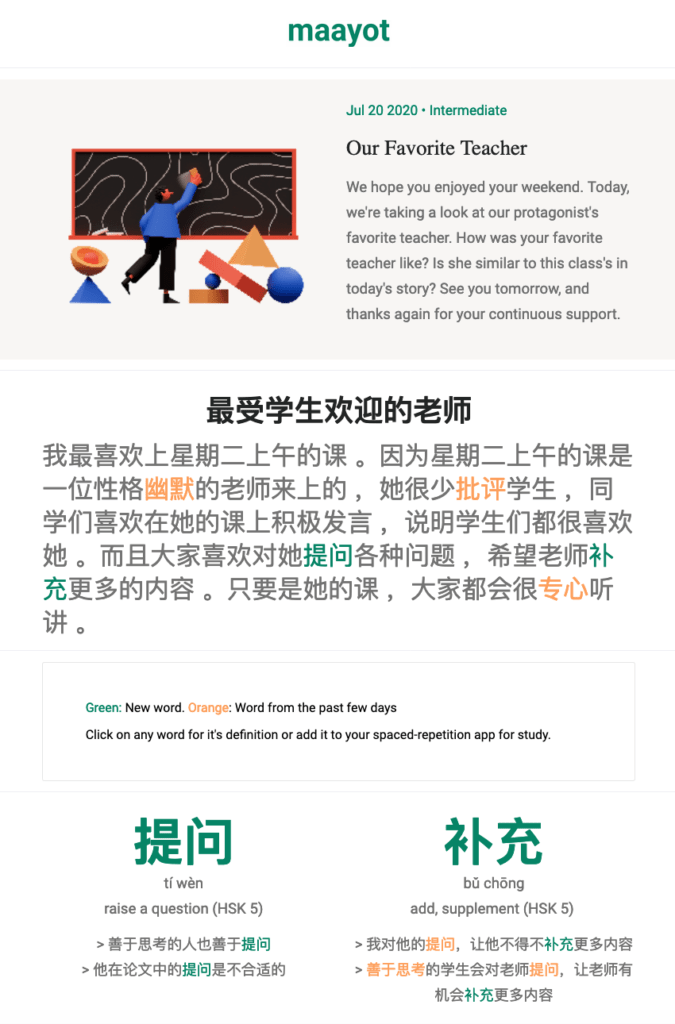No matter what language you learn, how to say “thank you” is a must known if you want to be friendly to others in a polite manner. You might know “thank you” is 谢谢 (xiè xiè) in Chinese. But do you want to know the other ways to say thank you and surprise your Chinese friends? If yes, let’s find out!
Most people know 谢谢. It could be hard for beginners to pronounce since you might not have that “x” started words in your language. To pronounce 谢谢 correctly, you’d better listen to native Chinese speakers’ pronunciation. Listen more and speak out more. Practice makes perfect.
For Chinese learners, the first thing you should know is the way we say thank you is very different sometimes. So it is not a good idea to translate English words into Chinese directly. I would say you just feel it in each particular context. Here I listed 7 ways to say thank you in Chinese, along with examples:
1. 谢谢 (xiè xie)
We say 谢谢 (xiè xie),谢谢啊 (xiè xiè a),谢谢你 (xiè xiè nǐ) or 谢谢你啊 (xiè xiè nǐ a) for most of cases:
- When someone gives way or seat to you;
- when someone holds the door for you;
- when your classmates or colleagues share a document with you;
- …

2. 太感谢你啦! (tài gǎn xiè nǐ la !)
感谢 (gǎn xiè) is a variation of 谢谢. You can also say 太感谢你啦 (tài gǎn xiè nǐ la), 太谢谢你了 (tài xiè xiè nǐ le), 十分感谢你 (shí fèn gǎn xiè nǐ) or 十分感谢你的帮助 (shí fèn gǎn xiè nǐ de bāng zhù). These expressions can be used to show your stronger thank-you emotion rather than just saying “谢谢”.
Example:
当你迷路了,有人帮你指路时……“笔直走,到十字路口再右拐…”
(dāng nǐ mí lù le, yǒu rén bāng nǐ zhǐ lù shí …“bǐ zhí zǒu, dào shí zì lù kǒu zài yòu guǎi …”)
Translation: When you get lost, someone helps you point out the way… “Go straight until the intersection, then turn right…”
You can say… “太感谢你了,十分感谢你的帮助!” (tài gǎn xiè nǐ le, shí fèn gǎn xiè nǐ de bāng zhù! )
3. 你人真好 (nǐ rén zhēn hǎo)
你人真好 means you are so nice. You may say that along with 谢谢, when someone helps you and you feel he/she is very friendly to others. You can also use this expression when someone 帮你指路. Another example can be…
Example:
当你刚刚入学或者入职,你的同学或者同事带你熟悉学校或办公室环境时,你可以说…
(dāng nǐ gāng gāng rù xué huò zhě rù zhí, nǐ de tóng xué huò zhě tóng shì dài nǐ shú xī xué xiào huò bàn gōng shì huán jìng shí, nǐ kě yǐ shuō…)
Translation: When you are new in a class or in a company, your classmate or colleague shows you around the school or office, you can say…
你人真好~ 十分感谢你带我熟悉附近环境!谢谢你!
(nǐ rén zhēn hǎo~ shí fèn gǎn xiè nǐ dài wǒ shú xī fù jìn huán jìng! xiè xiè nǐ! )
# Note about “~”:
Lots of Chinese people love to use “~” in text messages. It is a cute way to show you are friendly.
4. 辛苦了 (xīn kǔ le)
辛苦了 has a similar meaning with “thank you for your help and support. I really appreciate it”. We often say “老师,您辛苦了” (lǎo shī ,nín xīn kǔ le) to our teachers on the Teachers’ Day in China (10th September). But you can also use it when someone gives you a big favour. You can also say 辛苦你了 (xīn kǔ nǐ le).
Example 1:
教师节到了,你对你的中文老师说:“XX老师 ,您辛苦了!我的中文进步了许多,谢谢您教我中文!”(You may add the family name in front of 老师.)
jiāo shī jiē dào le ,nǐ duì nǐ de zhōng wén lǎo shī shuō: “XX lǎo shī, nín xīn kǔ le! wǒ de zhōng wén jìn bù le xǔ duō, xiè xiè nín jiāo wǒ zhōng wén!”
Translation: Chinese Teachers’ Day is coming, you may want to say thank you to your Chinese teacher… “Thank you, … teacher. My Chinese is getting better. Thank you for teaching me Chinese!”

Example 2:
当有人帮你搬家…你可以对他说… “谢谢你帮我搬东西,辛苦你了!”
dāng yǒu rén bāng nǐ bān jiā … nǐ kě yǐ duì tā shuō … “xiè xiè nǐ bāng wǒ bān dōng xī, xīn kǔ nǐ le!”
Translation: When someone helps you move home, you can say “thank you for helping me move home, thank you so much!”
5. 麻烦你了 (má fan nǐ le)
麻烦你了 has a similar meaning to 辛苦了. You can also say 太麻烦你了 (tài má fán nǐ le), 真是太麻烦你了 (zhēn shì tài má fán nǐ le) or 不好意思,真是太麻烦你了 (bú hǎo yì sī, zhēn shì tài má fán nǐ le). These can be used when you feel a bit sorry when someone helps you a lot or they spend lots of time or resources to help you. These thank-you expressions are similar to the English words “I couldn’t have done it without you”.
Example:
当有人帮你搬东西,你也可以用这个表达方式。但是这个人可能没问你收费,他/她可能是你的邻居…
dāng yǒu rén bāng nǐ bān dōng xī, nǐ yě kě yǐ yòng zhè gè biǎo dá fāng shì. dàn shì zhè gè rén kě néng méi wèn nǐ shōu fèi, tā /tā kě néng shì nǐ de lín jū…
Translation: You can also use this expression when someone helps you move home. But in this case, the person may not charge you anything, he/she could be your neighbour…
You can say…“谢谢你帮我搬东西,辛苦了,真是太麻烦你了。” (xiè xiè nǐ bāng wǒ bān dōng xī, xīn kǔ le, zhēn shì tài má fán nǐ le.)

6. 好人一生平安 (hǎo rén yī shēng píng ān)
The direct translation of 好人一生平安 is “wish nice people health and safe forever”, which sounds a bit weird in English. So as I said, do not think it in English, feel the meaning in a specific Chinese context, do not translate in your mind.
This expression is my way to say thank you to my close friends. It is a cute expression that you can say to your friends or classmates but not your boss or teachers.

Example 1:
When your close classmate or colleague help you with some questions, you can say…“太谢谢你了!谢谢你帮我解决这个问题,好人一生平安!”
tài xiè xiè nǐ le! xiè xiè nǐ bāng wǒ jiě jué zhè gè wèn tí, hǎo rén yī shēng píng ān! ”
Example 2:
When your close friend help you look after your dog when you are away at weekends, you can say… “谢谢你帮我照看我的狗狗,好人一生平安!”
xiè xiè nǐ bāng wǒ zhào kàn wǒ de gǒu gou, hǎo rén yī shēng píng ān! ”
7. For advanced…
For advanced, you can apply all these expressions in your way (灵活运用, líng huó yùn yòng). You may want to combine them, saying…
辛苦你了,真是太麻烦你了!你人真好,太感谢了!好人一生平安!
xīn kǔ nǐ le, zhēn shì tài má fán nǐ le! nǐ rén zhēn hǎo, tài gǎn xiè le! hǎo rén yī shēng píng ān!
After you say that, the one might say your Chinese is so good! You are so sweet! (你中文真好!嘴真甜!nǐ zhōng wén zhēn hǎo! zuǐ zhēn tián!)
Notes about 你 (nǐ) or 您 (nín):
For all the expressions containing the character 你, you’d better use 您 instead of 你 when the one is much older than you, saying around 10 years older, the last generation (比自己年长一轮,我们称他们为“长辈”, bǐ zì jǐ nián zhǎng yī lún, wǒ men chēng tā men wéi “zhǎng bèi ”) or they are your boss (老板/上司, lǎo bǎn / shàng si).
Now you know the variations of 谢谢. To see whether your understanding of these expressions is good or not, let’s go out and talk to Chinese people about what you learned today! And remember to say 谢谢 after they share the ideas about learning Chinese.
You might say…
太谢谢你啦!我正在学中文,谢谢你的指点。十分感谢!
tài xiè xiè nǐ la! wǒ zhèng zài xué zhōng wén, xiè xiè nǐ de zhǐ diǎn. shí fèn gǎn xiè!
Here you may not say 辛苦了 or 麻烦你了, since it is just a small talk, not a big favour.
Hope you enjoy today’s blog! Want to learn more?
Now you know the variations of 你好. To see whether your understanding of these expressions is good or not, let’s go out and talk to Chinese people about what you learned today! And remember to say 谢谢 (xiè xie, thank you) after they share the ideas about learning Chinese. Hope you enjoy today’s blog! Want to learn more? Click the links below:
More Chinese Learning Tips and Tricks!
Want to boost your Chinese?

With maayot, receive a daily engaging story in Mandarin Chinese based on your level.
How does it work?
?️ You’ll get a Chinese story once a day. It’s tailored to your level. Click on any character you don’t know to see it’s definition or add it to your spaced-repetition app.
? Two new words that you may not have studied yet from higher levels.
? Practice your listen with a daily native high-quality recording of the day’s story.
? Test your understanding of the text with a quick and simple quiz. If you read it with attention, it should be rather simple.
✏️ Practice your writing skills by answering to the day’s open-ended question.
You can register now to receive stories right away.


